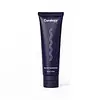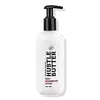What's inside
What's inside
 Key Ingredients
Key Ingredients

No key ingredients
 Benefits
Benefits

 Concerns
Concerns

 Ingredients Side-by-side
Ingredients Side-by-side

Water
Skin ConditioningCaprylic/Capric Triglyceride
MaskingCetearyl Alcohol
EmollientCetyl Alcohol
EmollientAloe Barbadensis Leaf Juice
Skin ConditioningSqualane
EmollientGlycerin
HumectantDimethicone
EmollientHydroxyethyl Acrylate/Sodium Acryloyldimethyl Taurate Copolymer
Emulsion StabilisingLimnanthes Alba Seed Oil
Skin ConditioningSodium Hyaluronate
HumectantButyrospermum Parkii Butter
Skin ConditioningCetearyl Olivate
Sorbitan Olivate
EmulsifyingArgania Spinosa Kernel Oil
EmollientSodium PCA
HumectantAllantoin
Skin ConditioningIsohexadecane
EmollientCetearyl Glucoside
EmulsifyingPolysorbate 60
EmulsifyingSorbitan Isostearate
EmulsifyingPhenoxyethanol
PreservativeEthylhexylglycerin
Skin ConditioningCitric Acid
BufferingSodium Hydroxide
BufferingWater, Caprylic/Capric Triglyceride, Cetearyl Alcohol, Cetyl Alcohol, Aloe Barbadensis Leaf Juice, Squalane, Glycerin, Dimethicone, Hydroxyethyl Acrylate/Sodium Acryloyldimethyl Taurate Copolymer, Limnanthes Alba Seed Oil, Sodium Hyaluronate, Butyrospermum Parkii Butter, Cetearyl Olivate, Sorbitan Olivate, Argania Spinosa Kernel Oil, Sodium PCA, Allantoin, Isohexadecane, Cetearyl Glucoside, Polysorbate 60, Sorbitan Isostearate, Phenoxyethanol, Ethylhexylglycerin, Citric Acid, Sodium Hydroxide
Aloe Barbadensis Leaf Juice
Skin ConditioningSimmondsia Chinensis Seed Oil
EmollientGlycerin
HumectantIsoamyl Laurate
EmollientCetearyl Alcohol
EmollientCetyl Alcohol
EmollientHydrolyzed Jojoba Esters
Skin ConditioningWater
Skin ConditioningCetearyl Olivate
Sorbitan Olivate
EmulsifyingButyrospermum Parkii Butter
Skin ConditioningPolysorbate 60
EmulsifyingCopernicia Cerifera Wax
Calcium Silicate
AbsorbentCarbomer
Emulsion StabilisingPersea Gratissima Fruit Extract
EmollientChamomilla Recutita Flower Extract
MaskingParfum
MaskingPhenoxyethanol
PreservativeEthylhexylglycerin
Skin ConditioningSorbitan Caprylate
EmulsifyingPropanediol
SolventBenzoic Acid
MaskingSodium Phytate
Benzyl Benzoate
AntimicrobialCitronellol
PerfumingCoumarin
PerfumingGeraniol
PerfumingHexyl Cinnamal
PerfumingHydroxycitronellal
PerfumingAloe Barbadensis Leaf Juice, Simmondsia Chinensis Seed Oil, Glycerin, Isoamyl Laurate, Cetearyl Alcohol, Cetyl Alcohol, Hydrolyzed Jojoba Esters, Water, Cetearyl Olivate, Sorbitan Olivate, Butyrospermum Parkii Butter, Polysorbate 60, Copernicia Cerifera Wax, Calcium Silicate, Carbomer, Persea Gratissima Fruit Extract, Chamomilla Recutita Flower Extract, Parfum, Phenoxyethanol, Ethylhexylglycerin, Sorbitan Caprylate, Propanediol, Benzoic Acid, Sodium Phytate, Benzyl Benzoate, Citronellol, Coumarin, Geraniol, Hexyl Cinnamal, Hydroxycitronellal
Ingredients Explained
These ingredients are found in both products.
Ingredients higher up in an ingredient list are typically present in a larger amount.
Aloe Barbadensis Leaf Juice comes from leaves of the aloe plant. Aloe Barbadensis Leaf Juice is best known for helping to soothe sunburns. It is also anti-inflammatory, moisturizing, antiseptic, and can help heal wounds.
Aloe is packed with good stuff including Vitamins A, C, and E. These vitamins are antioxidants, which help fight free-radicals and the damage they may cause. Free-radicals are molecules that may damage your skin cells, such as pollution.
Aloe Barbadensis Leaf Juice also contains sugars. These sugars come in the form of monosaccharides and polysaccharides, folic acid, and choline. These sugars are able to help bind moisture to skin.
It also contains minerals such as calcium, 12 anthraquinones, fatty acids, amino acids, and Vitamin B12.
Learn more about Aloe Barbadensis Leaf JuiceThis ingredient is also known as shea butter. It is an effective skin hydrator and emollient.
Emollients help soothe and soften your skin. It does this by creating a protective film on your skin. This barrier helps trap moisture and keeps your skin hydrated. Emollients may be effective at treating dry or itchy skin.
Shea butter is rich in antioxidants. Antioxidants help fight free-radicals, or molecules that may harm the body. It is also full of fatty acids including stearic acid and linoleic acid. These acids help replenish the skin and keep skin moisturized.
While Shea Butter has an SPF rating of about 3-4, it is not a sunscreen replacement.
Shea butter may not be fungal acne safe. We recommend speaking with a professional if you have any concerns.
Learn more about Butyrospermum Parkii ButterCetearyl alcohol is a mixture of two fatty alcohols: cetyl alcohol and stearyl alcohol. It is mainly used as an emulsifier. Emulsifiers help prevent the separation of oils and products. Due to its composition, it can also be used to thicken a product or help create foam.
Cetearyl alcohol is an emollient. Emollients help soothe and hydrate the skin by trapping moisture.
Studies show Cetearyl alcohol is non-toxic and non-irritating. The FDA allows products labeled "alcohol-free" to have fatty alcohols.
This ingredient is usually derived from plant oils such as palm, vegetable, or coconut oils. There is debate on whether this ingredient will cause acne.
Due to the fatty acid base, this ingredient may not be Malassezia folliculitis safe.
Learn more about Cetearyl AlcoholCetearyl Olivate is an emulsifier and texture enhancer. It is derived from the fatty acids of olive oil and Cetearyl alcohol, and is biodegradable.
As an emulsifier, it is used to prevent oils and waters from separating. It can also
Manufacturers use the name Olivem 1000. This ingredient has been found to preserve the natural microbiome of skin. Having a healthy microbiome helps keep our skin healthy and protects against harmful bacteria. This ingredient is grouped with Sorbitan Olivate under the name Olivem 1000.
Learn more about Cetearyl OlivateCetyl Alcohol is a fatty alcohol. Fatty Alcohols are most often used as an emollient or to thicken a product.
Its main roles are:
Though it has "alcohol" in the name, it is not related to denatured alcohol or ethyl alcohol.
The FDA allows products labeled "alcohol-free" to have fatty alcohols.
Learn more about Cetyl AlcoholEthylhexylglycerin (we can't pronounce this either) is commonly used as a preservative and skin softener. It is derived from glyceryl.
You might see Ethylhexylglycerin often paired with other preservatives such as phenoxyethanol. Ethylhexylglycerin has been found to increase the effectiveness of these other preservatives.
Glycerin is already naturally found in your skin. It helps moisturize and protect your skin.
A study from 2016 found glycerin to be more effective as a humectant than AHAs and hyaluronic acid.
As a humectant, it helps the skin stay hydrated by pulling moisture to your skin. The low molecular weight of glycerin allows it to pull moisture into the deeper layers of your skin.
Hydrated skin improves your skin barrier; Your skin barrier helps protect against irritants and bacteria.
Glycerin has also been found to have antimicrobial and antiviral properties. Due to these properties, glycerin is often used in wound and burn treatments.
In cosmetics, glycerin is usually derived from plants such as soybean or palm. However, it can also be sourced from animals, such as tallow or animal fat.
This ingredient is organic, colorless, odorless, and non-toxic.
Glycerin is the name for this ingredient in American English. British English uses Glycerol/Glycerine.
Learn more about GlycerinPhenoxyethanol is a preservative that has germicide, antimicrobial, and aromatic properties. Studies show that phenoxyethanol can prevent microbial growth. By itself, it has a scent that is similar to that of a rose.
It's often used in formulations along with Caprylyl Glycol to preserve the shelf life of products.
Polysorbate 60 is used to help stabilize products. It is a surfactant and emulsifier. These properties help keep ingredients together in a product. Surfactants help reduce surface tension between ingredients with different states, such as liquids and solids. Emulsifiers help prevent oils and waters from separating.
Polysorbate 60 is sorbitol-based and created from the ethoxylation of sorbitan. Ethoxylation is a chemical reaction used to add ethylene oxide. Sorbitan is a the dehydrated version of sorbitol, a sugar found in fruits.
In this case, the 60 comes from reacting 60 units of ethylene oxide with sorbitan.
Polysorbates are commonly used in medicine and foods.
Learn more about Polysorbate 60Sorbitan Olivate is created from the fatty acids in olive oil and sorbitol.
This ingredient is an oil in water emulsifier. It helps stabilize a product by preventing oils and waters from separating. Sorbitan Olivate also helps hydrate the skin.
Manufacturers sell sorbitan olivate under the name OliveM 1000. OliveM 1000 a multifunctional ingredient. It is self-emulsifying. According to a manufacturer, OliveM 1000 does not disrupt natural skin biome.
Due to its olive oil base, this ingredient may not be fungal-acne safe.
Learn more about Sorbitan OlivateWater. It's the most common cosmetic ingredient of all. You'll usually see it at the top of ingredient lists, meaning that it makes up the largest part of the product.
So why is it so popular? Water most often acts as a solvent - this means that it helps dissolve other ingredients into the formulation.
You'll also recognize water as that liquid we all need to stay alive. If you see this, drink a glass of water. Stay hydrated!
Learn more about Water